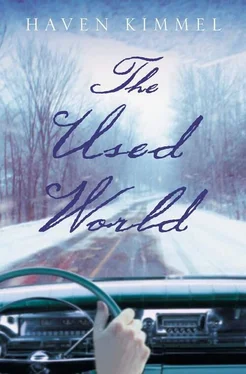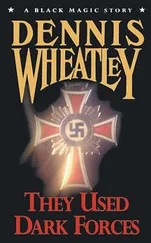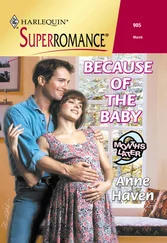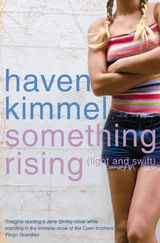1 ...6 7 8 10 11 12 ...19 Before her twenty-third birthday, when she left the church and took up with Hazel, Rebekah had never worn pants or cut her hair, not even into bangs, although lots of girls got by with that one. Rebecca’s hair had hung to the middle of her thighs, dark red at the roots and gradually lightening at the ends, until the last three inches were blond, fine as silk. Her baby hair. Her crowning glory. Vernon wouldn’t allow her mother to braid the blond hair, or put a rubber band around it. Once a week she had to use a VO5 Hot Oil Hair Treatment to protect it. Every year that passed was like the ring in a tree: blond as a baby; here you can see it starting to darken. Light, then strawberry, then more like a cherry, then like aged cherrywood—her life, her father’s life. By the time she cut it, that baby hair was a raggedy mess, most of it broken off and split in two; she pulled a comb through it hatefully, and her head hurt all the time from the weight of it on her scalp.
Until that day five years ago when Rebekah left the church, she’d never seen a movie or watched television or danced or been in the same room with alcohol. She’d never gone swimming or even taken a long bath, as it was considered immoral for girls to do so. She’d never been on a boat, an airplane, a train. She had been on a bus, in cars, trucks, tractors, and hay wagons. Garlic had been exotic to her, as were any spices beyond those in a traditional Thanksgiving dinner: sage, thyme, nutmeg. Salt. Her father ate onions as if they were apples, but didn’t hold with spicing food. She hadn’t learned the details of any world war, only the barest facts, and she didn’t know where on a map the great cities of Europe could be found. If she’d located the cities, she wouldn’t have known their currencies. She had never played a sport, had not run since she was a child, and her tendency to take long, brisk walks was frowned upon. At eighteen, twenty, she knew nothing about sex, only what she had heard whispered or otherwise referred to by her friends who’d married young, had children young.
But for all this naïveté, what was forced and what was natural to her, Rebekah had seen many dead bodies. The Prophetic Mission denied her the knowledge of sex and reproduction, but found death to be, in general, quite wholesome. She’d attended the calling hours and funerals of more people than she could recall. Though there were plenty she remembered: profiles—first just a nose, a temple, the back of the head meeting the silk pillow—who became her aunt Lovey; her grandparents; her mother; Sister Parson, who died old, and Sister Lynton, who was only twenty-nine; and children, too, and babies. Martin Peacock, who owned Peacock’s Mortuary, was Prophetic, and his funeral home was as familiar to her as any place in the world. The members of her church stood at the wake of every member who died, the extended families of every member, near strangers. They attended funerals when it was politic to do so, or when the service would be interesting, perhaps because a daughter from home who sang beautifully—a daughter who had since gone on to Olivet or Bob Jones University—would be there, singing.
INDIANA: CORN AND DEATH. She’d like a bumper sticker that said that. Ooh, that would vex her daddy, wouldn’t it? she thought, then realized she’d already gone about as far as she could where vexing was concerned, and was about to go the distance. The sky seemed somehow too close to the car—what was the problem here? The snow hadn’t started and yet the tires on the road sounded muffled, the color of a truck in the distance was dulled. She couldn’t tell where she was—somewhere on the County Line Road, but how far to go? Hadn’t it been a Wednesday? She would remember if Claudia had been there, she remembered everything else.
She had been wearing green, her best color, according to Hazel. A green cardigan because it was a cool morning in early May. She’d been sitting with Hazel at the counter when Peter came in alone. He nodded at the Cronies, gave a little salute to Hazel. Rebekah glanced at him, back down at her book. She had been reading Other Voices, Other Rooms, one of Hazel’s favorite novels. The mule had not yet hung himself from the mezzanine, but that scene was coming. Peter was average height, thin, wearing baggy blue jeans, a blue nylon jacket, a red knit cap, and later she would have a simple, bright memory of his face as she saw it for the first time, as he looked at Hazel and before he looked away. His cheeks were flushed from the spring wind, and his lips were red. The hair she could see at the edge of the cap was black, curly. Red cap, black hair, pink cheeks, red lips, his wide blue eyes fringed with black lashes. The blue was a surprise, the eyes themselves so round they were almost feminine, and the eyelashes, too.
He was not Vernon’s idea of what a young man should be. Rebekah watched him stroll into #14, pull out a drawer in a china cabinet, slide it back in slowly. He was wearing running shoes, something her father would never have tolerated in a son, if he’d had a son. Peter straightened a frame against the wall, tipped a floor-length mirror, rubbed the satin edge of a quilt; this was not how men behaved in her world. They stood still and kept a silent watch as their women committed such shenanigans; it was the province of the female to study objects and engage the earthly. She watched as he picked up an alligator travel case in #15 and carried it a few feet down the aisle, as if he were running late for a train. Rebekah laughed out loud before she could stop herself; the Cronies looked up a moment, and then went back to talking.
She wondered, in the months that followed and certainly now, what the human eye sees in that first moment. Do we know something, or do we decide it in an instant and only later rewrite the scene to imply that something decided on us? Because now, if she were asked, she’d say that he looked smart and funny, whimsical, sophisticated, gifted. She might even say that she saw something in his hands she loved, a certain eloquence, but in truth she didn’t, on that Wednesday, notice his hands at all. His eyes, that blue, told nothing about what he turned out to be. There were jokers in the church, men who could do imitations, who could tell jokes, even a few with a droll wit that was lost on nearly everyone. But no man in her life would have run like a girl with a travel case and make her see the train, and do it for the benefit of no one.
Rebekah had laughed, and the laugh hung in the air a moment the way a bell will after it’s stopped ringing. Peter turned, offered her a slight bow. Hazel glanced at her, went back to her magazine. The Cronies were silent a moment, then Red had said, “I told him I’d rather tow a Chevy than drive a Ford.”
“Yep, that’s right.”
“I don’t care if it’s a V-8 or a V-80, don’t be asking me should you buy a Ford truck.”
“That’s the way to say it,” Slim agreed.
“And then he sets over to the house night after night, watching grown men wrestle on the TV. His mom carries his food in to him like he’s a shut-in. I said I sure didn’t raise him to set like that.”
“His get-up-and-go got up and went, sounds like.”
“Hand me another cola, if you wouldn’t mind.”
Rebekah turned left onto Peter’s road, which had a number but everyone called it One Oak. The snow had just begun to fall and now she wondered if she hadn’t made a mistake, maybe, coming out this way before the storm. Before she could really regret it, there was his cabin. His mailbox, the short lane, three steps up, the broad porch, the screen door, his storm door, his windows. He was there—the porch light was on, and there was his little red truck. She’d intended to drive by, just drive by the once, but now all she could do was stop and wait for a sign, not from God, but from Peter. She no longer fit in her life and it was his fault and there was no sense going on until something was resolved. A silver strip of smoke curled up from the chimney, away. Snow began to settle in the upward curving arms of the trees, and Peter, if he was really home, gave nothing to go on. A note, a letter, should she leave something behind? But what should she say? That right there, as close as her own breath, she could see the faint scar on his palm where he’d been bitten by a cat? That the shirt of his she slept with was losing his scent, and when it was gone she would see no light in her life? She could say: The way you shake hands with strangers, play the guitar, know songs about umbrellas—these things have destroyed me. You gave me red wine, venison, you lifted the hair off the back of my neck, which no one has done since my mother died. Every person wore the look that spoke of this loss, it had happened to everyone, and they could all say these things: his smell, her voice, her body in sleep. What had happened to Rebekah? What has happened to me? she said aloud, and watched the door Peter didn’t open. What would she really say to him, if there were world enough and time, a letter like a book he would have to read but never get to finish?
Читать дальше












